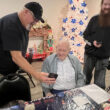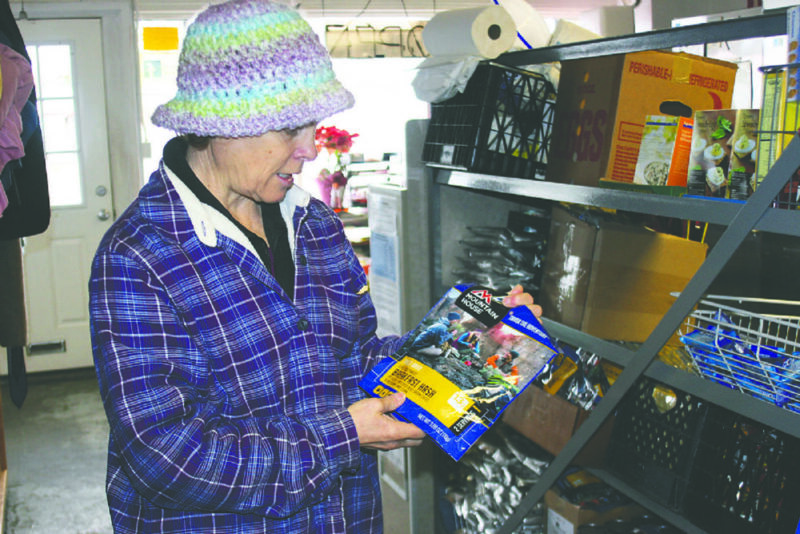Audrey Caro
Cindy Rice has been serving the community of Sweet Home in some capacity for decades.
When her two sons, now in their 30s, were young, she volunteered in schools, Cub Scouts, Boy Scouts and 4-H.
Rice, 57, worked as the Linn County Peer Court coordinator for three years in the early 2000s. When that program was defunded three years later, she decided to go back to school.
It took about a year and half for her to complete the liberal studies degree in Facilitating and Supporting Healthy Relationships in the Community, a specialized curriculum she developed at Oregon State University.
She was interested in social justice and helping others, Rice said.
Every day she uses something she learned from that program in her role as pantry manager of Sweet Home Emergency Ministries, she said.
Rice contributes to SHEM in a variety of ways, including taking care of paperwork, attending mandatory meetings and managing the stock.
Stocking those shelves provides quite an upper-body workout, she said.
“I can out-wrestle my two boys and husband,” Rice joked.
She also needs to think on her feet, sometimes with no time, resources, or energy.
The nonprofit provides food, clothing and other assistance to people in need of such services.
SHEM is open to clients three days a week; in between, volunteers sort items and stock shelves in the small storefront on Long Street.
It’s not uncommon for people to stop by during those off-hours to donate items.
“Nothing happens on a timetable here,” Rice said.
Last Friday, Kathy MacAdam and her daughter Bethany stopped by to drop off some eggs.
“Kathy has donated hundreds of dozens of eggs,” Rice said.
The MacAdam family operates Blessings Farm and Dairy and has more than 600 laying chickens.
Sometimes it is difficult for SHEM to get meat and eggs, which are a high-quality source of protein, Rice said.
Rice said because of how often people stop her around town and at church to contribute to the SHEM pantry, she knows how much she can fit in her car – 12 banana boxes.
She spends a significant amount of time behind the desk too, writing grants.
“The one to the Oregon Community Foundation Grant for a generator took 300 to 350 hours (to complete),” Rice said. “It was very involved.”
A grant she is currently working on, from Samaritan Health Services, will probably take about 60 hours, she said.
It is to help provide a gallon of milk for everyone who gets help from SHEM, a project that has partial funding through the Community Foundation in Sweet Home.
She always tries to partner with other organizations, she said.
Working at SHEM also takes a lot of people skills.
“When you meet someone at SHEM, they are in crisis mode,” she said. “What am I going to do to alleviate stress and lessen the load so they walk out the door knowing they have been cared for, not judged?”
While she has never been food insecure, Rice has seen what it does to people.
In addition to the clients, Rice works with a wide variety of volunteers, many of them retired, who come in to help each week.
Reading, gardening, and teaching her dog Jet new tricks are among the hobbies that help to alleviate some of the emotional toll of the volunteer work that she does.
She also likes to cycle up to Sunnyside and Green Peter when the weather allows.
“It’s a double-edged sword for me,” Rice said about volunteering at SHEM. “I love what I do here, but I wish I didn’t have to.”
Food boxes are a Band-Aid, she said.
As for how to solve the problems inherent in poverty, she said she doesn’t know but that “it all connects: housing, transportation, jobs.”
Significant drug and alcohol prevention and intervention programs may help, she said.
“Sometimes you see a sea of hopelessness and turn to coping mechanisms in order to cope and manage,” Rice said.
She does not think there is going to be a day when SHEM’s services are not needed but the board is planning for the future, she said.
“(We’ve) got a really forward-thinking board,” Rice said.
In August SHEM will be able to retire the mortgage on the building they occupy.
Once they own the property, they will be able to access more grants, Rice said.
SHEM does offer some financial assistance to clients, in addition to the food boxes.
The nonprofit helps with utility shut-off notices, one-time rental assistance and certain prescriptions.
Though Rice has volunteered for SHEM for a couple of decades, she decided not to be involved in the financial assistance aspect because of the emotional cost.
She still tears up when she tells the story of a young family, with three children, that sought help from SHEM several years ago.
The mother came in with a baby in her arms and two small children.
“(She was) scared, embarrassed that they needed help,” Rice said.
They sent her out with food and her husband was in the car with his head and hands on the steering wheel, sobbing because he couldn’t provide for his family.
His full-time job was cut to part-time and he lost benefits.
That family got back on their feet, Rice said.
“I like to think we gave that family hope,” Rice said.
Volunteering is hard work, but she wouldn’t trade it for anything.
“It spoke to me in my heart,” Rice said. “I know we’re doing the right thing to help people. What we do is not a big thing, but it is.”





